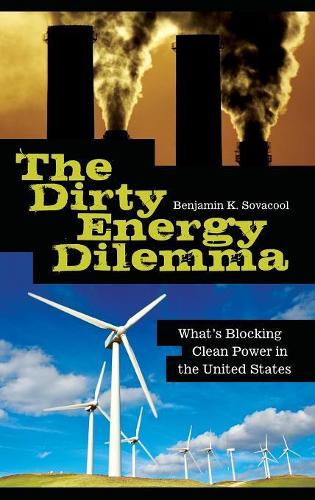
The Dirty Energy Dilemma: What's Blocking Clean Power in the United States
(Hardback)
Publishing Details
The Dirty Energy Dilemma: What's Blocking Clean Power in the United States
By (Author) Benjamin K. Sovacool
Bloomsbury Publishing PLC
Praeger Publishers Inc
30th October 2008
United States
Classifications
Tertiary Education
Non Fiction
333.790973
Winner of 2009 Nautilus Silver Award-Ecology/Environment/Sustainability 2009
Physical Properties
Hardback
320
Width 156mm, Height 235mm
652g
Description
The American electric utility system is quietly falling apart. Once taken for granted, the industry has become increasingly unstable, fragmented, unreliable, insecure, inefficient, expensive, and harmful to our environment and public health. According to Sovacool, the fix for this ugly array of problems lies not in nuclear power or clean coal, but in renewable energy systems that produce few harmful byproducts, relieve congestion on the transmission grid, require less maintenance, are not subject to price volatility, and enhance the security of the national energy system from natural catastrophe, terrorist attack, and dependence on supply from hostile and unstable regions of the world. Here arises The Dirty Energy Dilemma: If renewable energy systems deliver such impressive benefits, why are they languishing at the margins of the American energy portfolio And why does the United States lag so far behind Europe, where conversion to renewable energy systems has already taken off in a big way Corporate media parrot industry PR that renewable technologies just aren't ready for prime time. But Sovacool marshals extensive field research to show that the only barrier blocking the conversion of a significant proportion of the U.S. energy portfolio to renewables is not technologicalthe technology is therebut institutional. Public utility commissioners, utility managers, system operators, business owners, and ordinary consumers are hobbled by organizational conservatism, technical incompatibility, legal inertia, weak and inconsistent political incentives, ill-founded prejudices, and apathy. The author argues that significant conversion to technologically proven clean energy systems can happen only if we adopt and implement a whole new set of policies that will target and dismantle the insidious social barriers that are presently blocking decisions that would so obviously benefit society.
Reviews
Conventional energy sources are low-cost but dirty, finite, and prone to price volatility, while clean energy is sustainable and reduces air pollution and emissions of greenhouse gases. However, clean energy is more expensive, demands difficult changes from both consumers and suppliers, and results in environmental disruption, so how do we embark on a cleaner, more sustainable energy path Sovacool (Energy Governance Program, National Univ. of Singapore) solves this 'energy dilemma' by dismissing it. He argues that the negative aspects of clean energy are best ignored, even if doing so requires a federal mandate compelling utilities to purchase more expensive clean energy and forces energy consumers to pay a 'benefit charge' to finance their own reeducation by funding programs that promise to reduce consumers' aesthetic and environmental objections to clean power. * Choice *
When advocates of the conventional electric industry dismiss alternatives to fossil fuels and nuclear technology as immature, inefficient, and risky, says Sovacool (energy governance, National U. of Singapore), they are lying. He identifies the impediment to adopting them not as technological challenges, but social, cultural, economics, and political interests. He looks at financial and market impediments, political and regulatory obstacles, cultural and behavioral barriers, and aesthetic and environmental challenges. * SciTech Book News *
[A] gem of an analysis pertaining to the energy industry in the United States[A] superb piece of work * Energy Policy *
the book is not light reading, but is important reading for anyone with serious interest in national and global energy issues. Although I may not agree with Sovacool on all points, his work is informative, interesting and compelling in logic. Without question, The Dirty Energy Dilemma provides some very serious food for thought. I would add it to the required reading list for all energy policymakers. * Potomac Institute for Policy Studies, Waypoint Book Review *
Grappling with a topic that too many find boring, Sovacool ignites new passion to conserve energy, experiment with alternatives to fossil fuels, while seeking independence from suppliers who resent their customers along with a grid that's antiquated and burdensome. Obama's inaugural address offers hope that the time has come for the US to recognize that self-restraint can produce more freedom and happiness than excess, and Sovacool's book joins a rallying cry that marks the end of an era of so much wasted potential. * Yale Global Online *
Author Bio
Benjamin K. Sovacool is Research Fellow in the Energy Governance Program at the Centre on Asia and Globalization in the Lee Kuan Yew School of Public Policy at the National University of Singapore. He is Adjunct Assistant Professor in the Government and International Affairs Program at Virginia Polytechnic Institute. He investigated the social impediments to renewable energy systems for the NSF Electric Power Networks Efficiency and Security Program. He has worked in advisory and research capacities at Oak Ridge National Laboratory, the New York State Energy Research and Development Authority, the Virginia Center for Coal and Energy Research, and the U.S. Department of Energy's Climate Change Technology Program. He is the co-editor with Marilyn A. Brown of Energy and American Society: Thirteen Myths (2007) and a frequent contributor to such journals as Electricity Journal, Energy Policy, Stanford Environmental Law Journal, and Daedalus.
